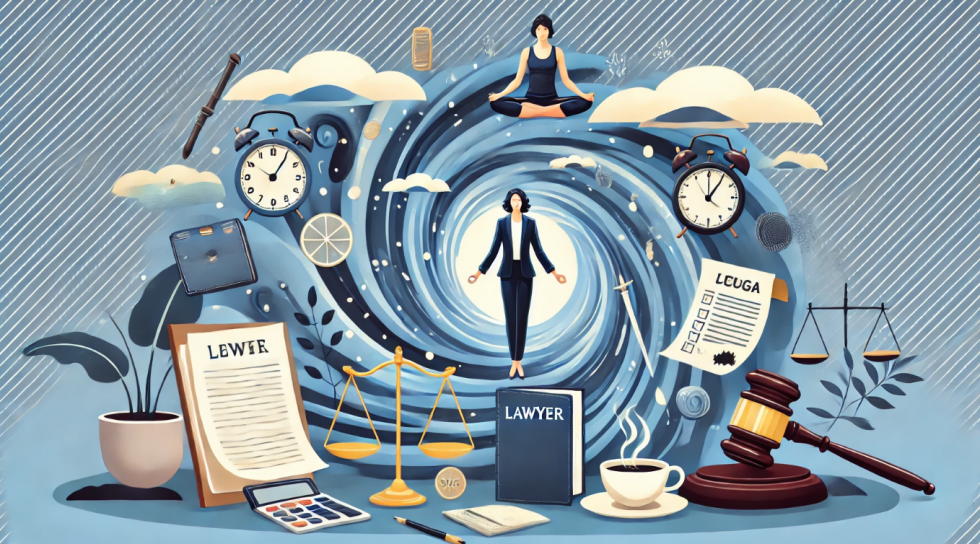Chronic stress in lawyers can manifest itself in the form of professional burnout syndrome, which reduces work efficiency and quality of life. For example, a study by the American Bar Association (ABA, 2022) showed that more than 40% of lawyers suffer from increased levels of anxiety and burnout. In addition, stress is a risk factor for the development of cardiovascular diseases, sleep disorders, depressive and anxiety disorders, and digestive problems.
Urgent tasks, difficult clients, and unexpected challenges in life and work activate the hypothalamic-pituitary-adrenal (HPA) axis in the body. Stress hormones are released—adrenaline and cortisol—which mobilize the body: the heart rate increases, blood pressure rises, and muscles tense. In the short term, this helps to cope with the task. However, constant activation of the HPA axis through chronic stress exhausts the body, which negatively affects cognitive functions such as attention, memory, and decision-making.
The “fight-flight-freeze” mechanism is activated during stress and helps to respond to danger. However, in the professional activities of lawyers, this reaction can be dysfunctional. For example, in stressful situations, a lawyer can “freeze”, avoiding making important decisions, or, conversely, act impulsively, which will affect the quality of his work and the provision of legal assistance.
However, not all stress is harmful. Eustress (positive stress) can help a lawyer focus on solving difficult cases or prepare for an important trial. Distress (negative stress), on the other hand, depletes the body’s resources.
A person who does not manage their own stress is more likely to experience psychological disorders, such as: anxiety and depression. They can arise from constant stress and uncertainty; post-traumatic stress disorder (PTSD). This is especially relevant for lawyers who work with military personnel or those affected by war; professional burnout syndrome. This is a common problem among lawyers, characterized by emotional exhaustion, loss of motivation and a sense of hopelessness.
Resilience (psychological stability) is one of the key skills a lawyer needs to effectively perform their duties. Developing resilience helps to better adapt to stressful situations, recover faster from emotional exhaustion, and maintain professional balance.
For lawyers working in stressful environments, it is important to take a holistic approach to stress management. Below is an expanded list of techniques and exercises that can help you effectively cope with stress:
Physiological techniques
1. Breathing exercises:
— the “4-7-8” technique: inhale for 4 seconds, hold your breath for 7 seconds, exhale for 8 seconds. Helps to quickly calm the nervous system;
— deep diaphragmatic breathing: slow inhalation through the nose, focusing on filling the abdomen, not the chest, and a long exhalation through the mouth;
— “square breathing”: inhale for 4 seconds, hold your breath for 4 seconds, exhale for 4 seconds, hold for 4 seconds again.
2. Progressive Muscle Relaxation (Jacobson): Sequentially tensing and relaxing major muscle groups (arms, shoulders, neck, back, legs). This helps reduce the physical tension that often accompanies stress.
3. Physical activity:
— regular aerobic exercise (running, swimming, cycling) reduces cortisol levels and promotes the production of endorphins;
— yoga: combines physical exercise, breathing, and meditation, which effectively reduces stress;
— stretching: helps relieve muscle tension and improve overall tone.
4. Contrast shower: alternating hot and cold water activates blood circulation and the nervous system, improving well-being.
Psychological techniques
1. Mindfulness practices:
— meditation: daily meditation, even for 10-15 minutes, helps calm the mind and focus on the present moment;
— the practice of “body scanning”: slowly focusing attention on different parts of the body — from head to toe — in order to identify and relieve tension.
2. Visualization technique: Imagine yourself in a peaceful place (e.g., by the sea or in a forest). Use details (sounds, smells, textures) to create a sense of immersion.
3. Cognitive-behavioral techniques:
— keeping a thought journal: write down disturbing thoughts to become aware of their impact and find rational counterarguments;
— reframing problems: instead of focusing on the negative aspects of the problem, look for opportunities for learning or development.
4. Maintaining social connections: Regular communication with colleagues, friends, or family helps reduce emotional stress.
5. The “3 Good Things” Technique: Every night, write down three positive things that happened during the day. This helps shift your focus from the negative to the positive.
Emotional relaxation techniques
1. Laughter therapy: watching comedy films or stand-up comedy, or simply talking to people who bring joy, reduces stress levels.
2. Therapeutic writing: Write down your thoughts, emotions, and experiences. This helps to structure problems and ease emotional distress.
3. Music therapy: Listening to your favorite music that has a calming or uplifting effect. Classical or instrumental music is especially effective for relaxation.
Organizational techniques
1. Pomodoro Technique: Dividing work into 25-minute intervals with short breaks helps you stay focused and avoid overload.
2. Planning the day: creating a realistic schedule, taking into account breaks and recovery time.
3. Delegation: the ability to delegate some tasks to colleagues or assistants helps reduce the workload.
Emergency techniques
1. Grounding Method: Use the 5-4-3-2-1 rule: name 5 things you see, 4 sounds you hear, 3 things you can touch, 2 smells, and 1 taste. This helps you calm down in times of acute stress.
2. “Quick massage”: A light massage of the neck, shoulders, or hands helps to quickly relieve physical tension.
3. The “STOP” method:
— S (Stop): Stop.
— T (Take a breath): Take a few deep breaths.
— O (Observe): Assess the situation, your thoughts and emotions.
— P (Proceed): Make an informed decision.
Using these techniques allows you to maintain productivity, avoid emotional burnout and maintain a high quality of professional activity even in difficult conditions. Effective stress management is a key factor for the professional success and well-being of lawyers. The use of scientifically based methods and exercises will help lawyers develop resilience, cope with professional challenges and maintain mental health.
List of sources:
- American Bar Association. Lawyer Well-Being Report (2022). 2. Verywell Mind. “Stress and Cognitive Function” (2023). 3. Neuronews. “Chronic Stress and Its Consequences” (2022).

Maria Melnychuk
psychologist, Gestalt psychotherapist, family psychotherapist, teacher




